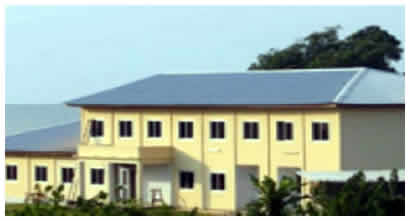 The Experimental Research Station on Marine Ecosystems (SERECOMA) of Kribi is an operational structure of the Institute of Agricultural Research for Development (IRAD) created by the Resolution N° 000017/IRAD/CA/12/2019 of December 13, 2019 of the Board of Directors on the Organization Chart of the Institute of Agricultural Research for Development (IRAD).
The Experimental Research Station on Marine Ecosystems (SERECOMA) of Kribi is an operational structure of the Institute of Agricultural Research for Development (IRAD) created by the Resolution N° 000017/IRAD/CA/12/2019 of December 13, 2019 of the Board of Directors on the Organization Chart of the Institute of Agricultural Research for Development (IRAD).
It is located in Kribi in the Ocean department of the South Cameroon region. Three branches are attached to it, namely: the Ebodjé Branch, the Édéa Branch and the Lolodorf Branch.
Specifically, the Station's mission is to conduct research in the maritime and coastal field, with a view to promoting the well-being of people in relation to the maritime and coastal space (Atlantic Ocean).
I- Multidisciplinary research units
II- Activities and Projects
- Coastal erosion management and protection of the Cameroonian coastline
General Objective
To study the coastal and sedimentary dynamics of the southern coastal strip of Cameroon..
Specific Objectives
- Identify the human activities responsible for the acceleration of the erosion phenomenon along the coastal fringe;
- Characterise and quantify the coastal currents and the sedimentary materials carried by these currents;
- Assess the evolution of the coastline;
- Draw up a map of the erosion and accretion zones in the southern part of the Cameroonian coast;
- Propose a development plan and adapted works for the Cameroonian coast.
- Ecology and systematics of synodontid fish and their parasites: pre-farming feasibility
General objective
To carry out the systematic ecology of Synodontis fish and their parasites: proposal of ways of culture.
Specific objectives
- To make an inventory of Synodontis species and their parasites.
- To carry out the ecology of the fish and their parasites.
- Identify the impact of abiotic and biotic factors on fish health and avoidance methods.
- Understanding the ecology of ghost shrimp (Biatowé) with a view to their domestication
- Valorisation of broiler droppings through maggot/earthworm production in a fish-poultry integration system in Cameroon.
General Objective: evaluate the economic and nutritional benefits of using poultry droppings for the production of maggots and earth worms as supplementary diets for fish and broiler.
Specifics Objectives
- To investigate the different species of fly larvae produced using poultry droppings;
- To investigate fly larvae and earth worm productivity using poultry droppings;
- To investigate the cost benefit of supplementing fish and broiler feeding with fly larvae or earth worm; and
- To investigate the impact of supplementing fish and broiler diets with fly larvae or earthworm on carcass quality.
- Monitoring the exploitation of fishery resources in the Ocean Department: the case of the Mboamanga and Londji landing stage
General Objective
To evaluate the exploitation of fishery resources in the two large landing stages of the ocean.
Specific Objectives
- Identify the different species landed and their proportion of the catch;
- Characterise the different species landed (size-weight);
- Make an inventory of the fishing gear used.
- Domestication and production of Cynoglosussenegalensis (tropical sole) in Cameroon
General Objective: to provide the basic elements for the domestication and production in captivity of crab of the genus Portinus Validus.
Specific Objectives
- Improvement in the formulation of feeds based on local by-products and improvement of formulation strategies at different stages of growth.
- Examination of the potential of Portinus Validus crabs by determining the possibilities and modalities of rearing / growing of the species.
- Domestication and captive production of Portinus Validus crab
General Objective
To provide the basic elements for the domestication and captive production of PortinusValidus crab.
Specific Objectives :
- To improve the formulation of feed based on local by-products and the formulation strategy at different growth stages;
- Examine the potential of Portinus Validus crabs by determining the possibilities and modalities of rearing / growing the species.
- Evaluation of the performance of native micro-algae in larviculture of Farfantepenaeusnotialis and Melicertuskerathurus shrimps.
General Objective
To evaluate the performance of microalgae strains from the Mpalla mangrove on Farfantepenaeusnotialis and Melicertuskerathurus shrimp larvae''.
Specific Objectives
- Déterminer le profil de croissance des différentes espèces de micro algues d’intérêt ;
- Évaluer les performances des souches sur la croissance des larves.
- Marine shrimp farming
General Objective
To obtain commercial size shrimps.
Specific Objectives
- Determine the duration of eggs from laying to hatching; and/or
- Determine the different larval stages (from nauplii to the first post larva).
Contacts
P.o. Box 219 KRIBI CAMEROUN
Tél/Fax: (237) 33 46 16 46/33 46 14 15
C.T.P (237) 242 01 27 20
E-Mail :This email address is being protected from spambots. You need JavaScript enabled to view it.
